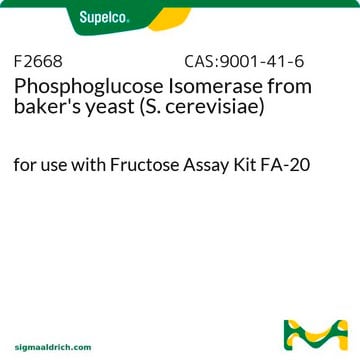P2621
Phosphomannose Isomerase from Escherichia coli
recombinant, expressed in E. coli, ammonium sulfate suspension, ≥50 units/mg protein
Synonym(s):
D-Mannose-6-phosphate ketol-isomerase, Mannose Phosphate Isomerase, PMI
Sign Into View Organizational & Contract Pricing
All Photos(1)
About This Item
MDL number:
UNSPSC Code:
12352204
NACRES:
NA.54
Recommended Products
recombinant
expressed in E. coli
Quality Level
form
ammonium sulfate suspension
specific activity
≥50 units/mg protein
storage temp.
2-8°C
Application
PMI is used to study cell wall synthesis and energy production. PMI has been used to study how EDTA and metal ions, such as Zn++, Co++, Fe++, Mn++ and Cu++., can affect recovery and thermal stability. It may be used to study PMI′s effect on various alginate biosynthetic enzymes such as phosphomannomutase (PMM), GDP-mannose pyrophosphorylase (GMP), and GDP-mannose dehydrogenase (GMD).
Biochem/physiol Actions
Phosphomannose Isomerase (PMI) catalyses the interconversion of mannose 6-phosphate (Man-6-P) and fructose 6-phosphate (Fru-6-P), which provides a link between glucose metabolism and mannosylation.
Packaging
Bottomless glass bottle. Contents are inside inserted fused cone.
Unit Definition
One unit will convert 1.0 μmole of D-mannose 6-phosphate to D-fructose 6-phosphate per min at pH 7.6 at 25 °C, using a coupled enzyme system with phosphoglucose isomerase and glucose-6-phosphate dehydrogenase.
Physical form
Supplied as a suspension in 3.2 M ammonium sulfate
Storage Class Code
12 - Non Combustible Liquids
WGK
WGK 1
Flash Point(F)
Not applicable
Flash Point(C)
Not applicable
Personal Protective Equipment
dust mask type N95 (US), Eyeshields, Gloves
Certificates of Analysis (COA)
Search for Certificates of Analysis (COA) by entering the products Lot/Batch Number. Lot and Batch Numbers can be found on a product’s label following the words ‘Lot’ or ‘Batch’.
Already Own This Product?
Find documentation for the products that you have recently purchased in the Document Library.
Craig T Narasaki et al.
PloS one, 6(10), e25514-e25514 (2011-11-09)
Coxiella burnetii, the etiologic agent of human Q fever, is a gram-negative and naturally obligate intracellular bacterium. The O-specific polysaccharide chain (O-PS) of the lipopolysaccharide (LPS) of C. burnetii is considered a heteropolymer of the two unusual sugars β-D-virenose and
Stéphanie Desvergnes et al.
Bioorganic & medicinal chemistry, 20(4), 1511-1520 (2012-01-25)
In the design of inhibitors of phosphosugar metabolizing enzymes and receptors with therapeutic interest, malonate has been reported in a number of cases as a good and hydrolytically-stable surrogate of the phosphate group, since both functions are dianionic at physiological
Michael Newcomb et al.
Applied microbiology and biotechnology, 90(2), 625-634 (2011-02-15)
Clostridium thermocellum, an anaerobic, thermophilic, and ethanogenic bacterium produces a large cellulase complex termed the cellulosome and many free glycosyl hydrolases. Most cellulase genes scatter around the genome. We mapped the transcripts of the six-gene cluster celC-glyR3-licA-orf4-manB-celT and determined their
Studies on the phosphomannose isomerase of Amorphophallus konjac C. Koch II. Effect of divalent metal ions on the EDTA-treated enzyme
Takao Murata
Plant & Cell Physiology, 16, 963-970 (1975)
Daisuke Tsuji et al.
Annals of neurology, 69(4), 691-701 (2011-04-27)
Novel recombinant human lysosomal β-hexosaminidase A (HexA) was developed for enzyme replacement therapy (ERT) for Tay-Sachs and Sandhoff diseases, ie, autosomal recessive GM2 gangliosidoses, caused by HexA deficiency. A recombinant human HexA (Om4HexA) with a high mannose 6-phosphate (M6P)-type-N-glycan content
Our team of scientists has experience in all areas of research including Life Science, Material Science, Chemical Synthesis, Chromatography, Analytical and many others.
Contact Technical Service








